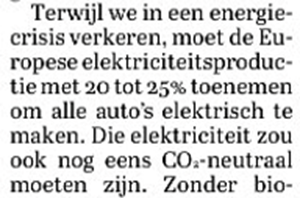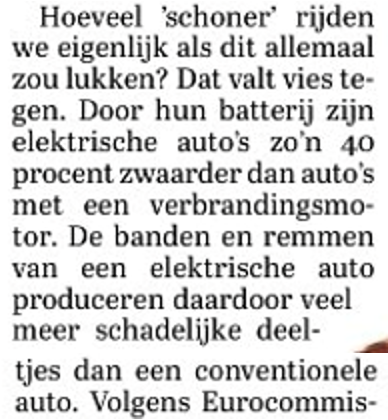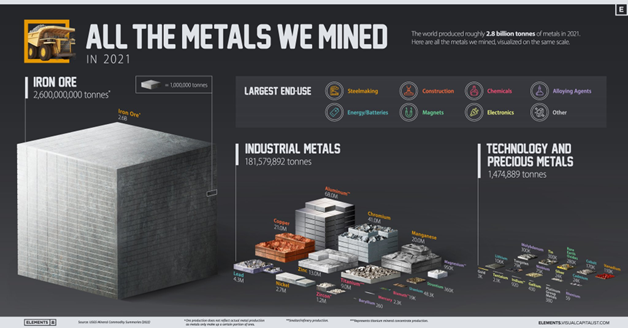
Today the @telegraaf (largest Dutch newspaper) printed a large opinion piece by MP @Rob_Roos, exhorting the EU to vote against the ban on combustion cars by 2035 under the heading:
"Electrification car park will become a nightmare"
Let me explain why his arguments are wrong.
"Electrification car park will become a nightmare"
Let me explain why his arguments are wrong.

I research EVs at the @TUeindhoven and to be honest, the only thing I feel I can compliment Rob on here is the suit.
Factually there are just so. many. problems.
But:
1) He offers a very reliable list of anti-EV arguments.
2) This vote is really important.
So here we go again.
Factually there are just so. many. problems.
But:
1) He offers a very reliable list of anti-EV arguments.
2) This vote is really important.
So here we go again.
Argument 1: "we will lose many jobs".
My retort: "You can fool yourself that people will keep buying the outdated technology forever but you will not fool worldwide consumers. As EVs get cheaper to buy and own they will switch and the environment will thank them."
My retort: "You can fool yourself that people will keep buying the outdated technology forever but you will not fool worldwide consumers. As EVs get cheaper to buy and own they will switch and the environment will thank them."

To be clear: EVs WILL get cheaper to buy before 2030 and cheaper to own before ~2025. That's not just my analysis but also that of @BloombergNEF's @colinmckerrache and many others.
This is like the producers of incandescent lightbulbs trying to stop LEDs.
about.newenergyfinance.com/electric-vehic…
This is like the producers of incandescent lightbulbs trying to stop LEDs.
about.newenergyfinance.com/electric-vehic…
Which brings me to this important vote.
I am certain electric vehicles (EVs) are the future but the industry is dragging its feet and this EU ban on combustion engines in 2035 will give a clear signal to an industry in denial.
I wrote about it before.

I am certain electric vehicles (EVs) are the future but the industry is dragging its feet and this EU ban on combustion engines in 2035 will give a clear signal to an industry in denial.
I wrote about it before.
https://twitter.com/AukeHoekstra/status/1534433693791551488

We even wrote an entire white paper to sway this vote, explaining why banning combustion cars in the EU is a good idea.
It helped to shift the needle a (tiny) bit before and maybe it can again: please share it if you know anybody involved in this vote!
dropbox.com/s/4gv2pdrl4pnw…
It helped to shift the needle a (tiny) bit before and maybe it can again: please share it if you know anybody involved in this vote!
dropbox.com/s/4gv2pdrl4pnw…

Argument 2: “We are in an energy crisis and EVs make us use 20-25% MORE electricity, often not renewable!”
Less misleading framing: EVs use 4x LESS (!) energy than combustion vehicles & switch our dependency from oil (Russia’s biggest cash cow) to any source of electricity.
Less misleading framing: EVs use 4x LESS (!) energy than combustion vehicles & switch our dependency from oil (Russia’s biggest cash cow) to any source of electricity.

And yes, electricity generation is largely unsustainable. But even on the current mix, EVs already emit about 70% less greenhouse gas over their lifetime (battery production included).
See my pinned thread for more research and debunks.
See my pinned thread for more research and debunks.
https://twitter.com/AukeHoekstra/status/1333192338139701249?s=20&t=lKY8iRrmkO_0hS2lOuecaQ
Argument 3: "We need over 6 million new charge points in 7 years, which is impossible."
6 million new public charge points is about right.
But that's 1 charger for just 2% of public parking spaces.
If that's ever going to be one of the EU's hardest problems we can be very glad.

6 million new public charge points is about right.
But that's 1 charger for just 2% of public parking spaces.
If that's ever going to be one of the EU's hardest problems we can be very glad.


Argument 4: "EVs will require a drastic upgrade of the electricity grid!"
2 reasons this is nonsense:
1) The transition mantra is “electrify everything”. Which means we have to upgrade the electricity grid anyway, also without EVs. The added cost from EVs would be minimal.
2 reasons this is nonsense:
1) The transition mantra is “electrify everything”. Which means we have to upgrade the electricity grid anyway, also without EVs. The added cost from EVs would be minimal.

2) But EVs also stand still 95% of the time and will use “smart charging”, enabling them to use cheap wind and solar at moments when other demand is limited.
NL is leading the world here and I expect it will be standard on every charge point before 2030.
NL is leading the world here and I expect it will be standard on every charge point before 2030.
Argument 5: “They are not cleaner: they are 40% heavier and therefore tires and breaks produce more particulate matter.”
We switch to EVs because they emit ~70% less CO2 now and ~90% less in 2050. So they are cleaner in that respect.
As for weight and particulates...
We switch to EVs because they emit ~70% less CO2 now and ~90% less in 2050. So they are cleaner in that respect.
As for weight and particulates...

Battery weight ~halves every ten years while the electric drive train is lighter.
Right now they might be 20% (not 40%) heavier but the bulk of EVs sold before 2035 will be LIGHTER.
So in discussions over the 2022-2035 timeframe, this "EVs are heavier" argument needs to DIE.
Right now they might be 20% (not 40%) heavier but the bulk of EVs sold before 2035 will be LIGHTER.
So in discussions over the 2022-2035 timeframe, this "EVs are heavier" argument needs to DIE.
Also, EVs don’t emit anything from their exhaust (which are smaller, more numerous and more dangerous particles than tire particles).
And EVs emit MUCH LESS from their brakes (also dangerous stuff) because they regenerate using their motor (charging the battery while braking).
And EVs emit MUCH LESS from their brakes (also dangerous stuff) because they regenerate using their motor (charging the battery while braking).
Argument 6: “We need more scarce lithium, cobalt, graphite and nickel and this stuff is controlled by dictatorships like China.”
Let me offer another picture showing how the impact of these metals DWARFS the demand for fossil fuels and other metals.

Let me offer another picture showing how the impact of these metals DWARFS the demand for fossil fuels and other metals.
https://twitter.com/AukeHoekstra/status/1586847277846503426

Even zooming in on metals the amounts we need are tiny.
We can get this stuff from many countries.
China is just the fastest and cheapest player.
But we ARE dependent on Russia and Saudi Arabia for oil. Something only EVs can change since ~70% of oil is used for road transport.

We can get this stuff from many countries.
China is just the fastest and cheapest player.
But we ARE dependent on Russia and Saudi Arabia for oil. Something only EVs can change since ~70% of oil is used for road transport.


“The cherry on the cake? Breton wants EU companies to keep exporting gasoline cars!”
I have bad news for Breton and Roos: they can love their polluting combustion cars but by 2035 it will be almost impossible to sell expensive, outdated, polluting combustion cars to anyone.
I have bad news for Breton and Roos: they can love their polluting combustion cars but by 2035 it will be almost impossible to sell expensive, outdated, polluting combustion cars to anyone.
Roos his conclusion: “So it’s impossible, hardly better for the environment, increases dependency on dictatorships, and most of the world will not join. We need to vote against.”
My conclusion: this is basically a litany of lies:
My conclusion: this is basically a litany of lies:

EVs are not impossible but unavoidable.
EVs decreases our dependency on (petro) dictatorships.
EVs are simply a better technology that the whole world will adopt.
We can drag our feet, pollute more, and lose more money and jobs. Or we get with the program.
Vote carefully!
/end
EVs decreases our dependency on (petro) dictatorships.
EVs are simply a better technology that the whole world will adopt.
We can drag our feet, pollute more, and lose more money and jobs. Or we get with the program.
Vote carefully!
/end
Correction: ~70% of oil is used in transport but only ~50% in road transport. My bad.
iea.org/data-and-stati…
Addition: don't confuse dependence on fossil fuels with dependence on metals.
Without metals, less new goods are produced.
Without fossil fuels, everything stops.
iea.org/data-and-stati…
Addition: don't confuse dependence on fossil fuels with dependence on metals.
Without metals, less new goods are produced.
Without fossil fuels, everything stops.

• • •
Missing some Tweet in this thread? You can try to
force a refresh






